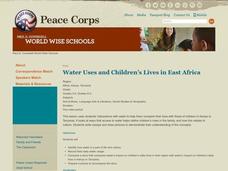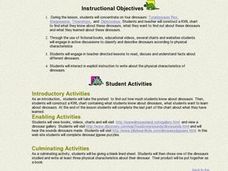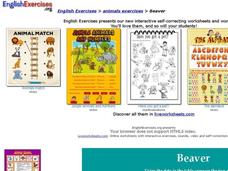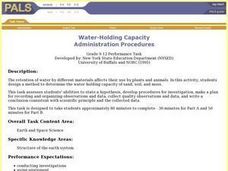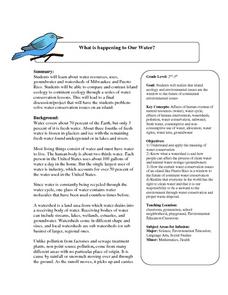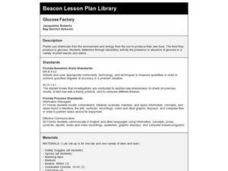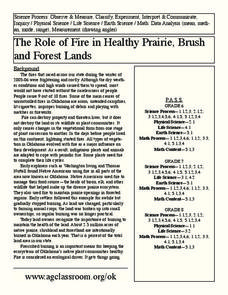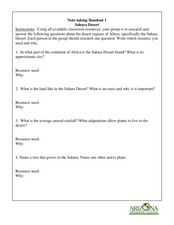Curated OER
Beaver Ecology
Learners explore the lives of bgeahvers. They identify the physical and behavioral adaptations that help beavers survive in their environment. Students compare and contrast how beavers influence the ecology of both forest and aquatic...
Curated OER
Tree Friends
Students are introduced to tree structure and use. They identify their special tree using all senses except sight. Students identify six different internal parts within a cross section of tree trunk (bark, phloem, xylem, cambium,...
Curated OER
Pollination
Learners investigate pollination. In this plant biology lesson, students study a diagram of the reproductive parts of the flower and dissect and identify the parts of a real flower.
Curated OER
Water Uses and Children's Lives in East Africa
Learners identify how water use is part of life and culture. Students record their daily water usage and compare results with classmates. Learners complete the graphic organizer on water and children. Students compose an essay, which...
Curated OER
Animal Diversity
Students examine plants and animals for their similarties and differences. They are read stories and note how the animals in the stories do not have the qualities that real animals have. They complete a worksheet to end the lesson.
Curated OER
Nuclear Power Gets A Boost
Students examine nuclear plants and how they use fission reactions to generate electricity, compare fusion reactions to fission, and read about technology that may soon allow fusion to become practical for producing nuclear power...
Curated OER
Pio, Pio, Que Frio
Students investigate the characteristics of living things. They determine that different organisms have different needs and describe and compare them. They draw and verbally respond about their favorite animal.
Curated OER
The Secret Garden
Students explore plants in science and England as they synthesize data from the book, "The Secret Garden in this twelve lessons unit. Comparisons between the nuturing needs of plants and humans are made.
Curated OER
Correlation Chapter 1
Middle schoolers compare ways in which people form different cultures think about and deal with their physical environment and social conditions. They identify examples of change and recognize examples of cause and effect relationships....
Curated OER
Dinosaurs - Physical Characteristics
Students describe the physical characteristics of dinosaurs, compare and contrast the evolution of land, and they explore the extinction of dinosaurs.
Curated OER
The Joy of a Garden-Earth Day
Students explore the purpose of a garden. In this Earth Day lesson, students read the story The Gardener and complete a Venn diagram comparing life in a city to farm life. Students discuss Earth Day and plant flowers in a garden .
Curated OER
ESL: Beaver Activity
In this ESL beaver worksheet, students read a chart comparing the American and European beavers, then fill in blanks in text about facts in the chart.
Curated OER
Water-Holding Capacity
Students design and conduct an experiment to compare the water-holding capacity of sand, soil, and moss. They measure the change in weight for each material after adding the same amount of water to each material.
Curated OER
"Julie of the Wolves"
Fifth graders research life in Alaska and compare life there to their lives in this instructional activity. They read "Julie of the Wolves." They research through the novel and other reference books facts about the Alaskan climate and...
Curated OER
Moving and Growing
Young scholars learn to understand the role of both skeletons and exoskeletons. In this lesson on exoskeletons, students locate and label bones on diagram of a human skeleton, and observe and discuss bones of chicken and fish. Young...
Curated OER
What is Happening to Our Water?
Young scholars compare and contrast Wisconsin's water resources to that of Puerto Rico. They research books about islands, particularly the Puerto Rican islands. Student view illustrations of island ecology. They discuss the...
Curated OER
Glucose Factory
Fourth graders determine, through laboratory activity, the presence or absence of glucose in a variety of plant leaves and stems. They work in groups and perform a three part laboratory which shows them how plants convert sunlighht to food.
Curated OER
Science in the Past
Students research the science of ancient Native American people. They compare native science to the present time. They create a project that they can present to their classmates. The project could be a report, poster, Power Point...
Curated OER
The Role of Fire in Healthy Prairie, Brush and Forest Lands
Students create a Venn diagram to compare and contrast wildfires and prescribed fires. In this earth science lesson, students conduct a series of experiment to explore fire characteristics. They describe favorable conditions to start a...
Curated OER
Note-Taking Handout 1: Sahara Desert
In this research skills activity, students collect information about the desert regions, savanna regions, and rainforest regions of Africa and then respond to 7 questions about each of the regions. Students then compare the regions using...
Curated OER
Stop the Bleeding
Students explore various parts of the heart and blood vessels . They begin with an overview of the components of the cardiovascular system. They see a cross section of an artery and watch how a blood clot develops.
Curated OER
Our Healthy Bodies
Students complete a variety of activities designed to enhance their awareness of their bodies. They examine pictures of themselves, taken at various points in the year and examine and compare their bodies. They enjoy a healthy snack...
Curated OER
The Three Worm Phyla
Ninth graders examine the three worm phyla. In this classification activity, 9th graders observe, compare and contrast the planarian, tapeworm, and fluke.
Curated OER
Dinosaurs 2: What Were Dinosaurs Like?
Students compare and contrast dinosaurs to animals that are alive today through basic research.





